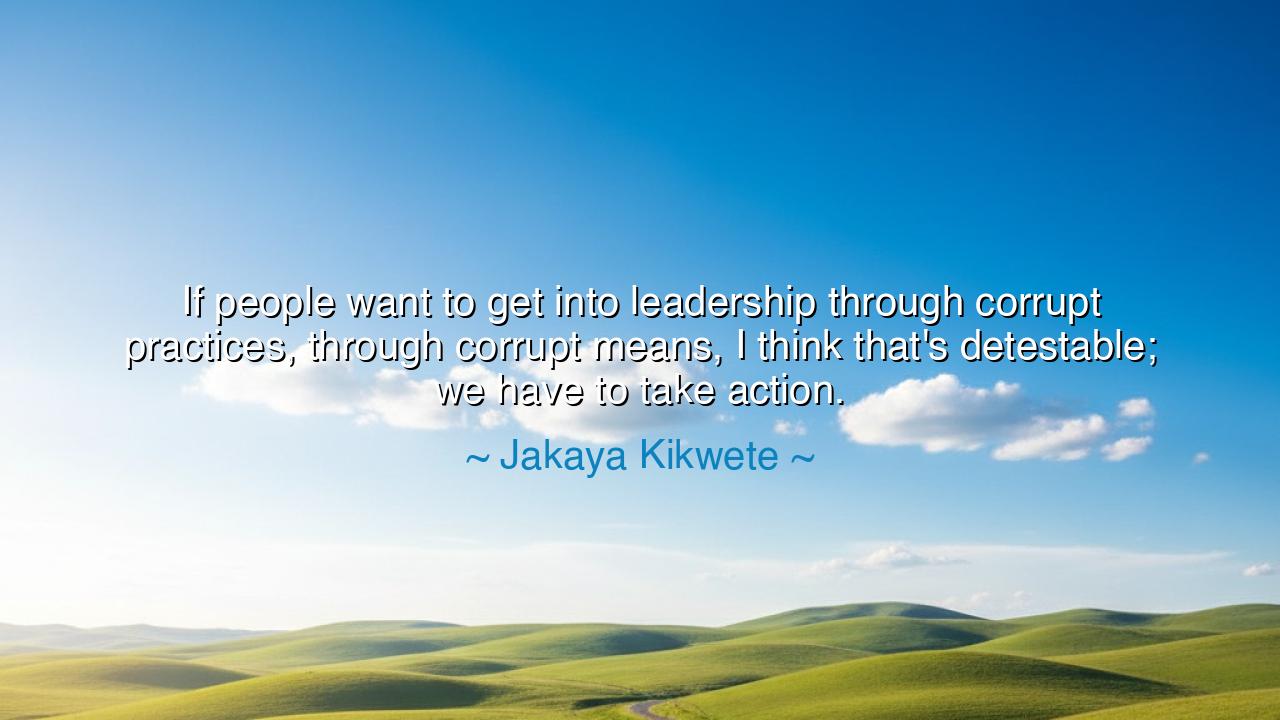
If people want to get into leadership through corrupt practices
If people want to get into leadership through corrupt practices, through corrupt means, I think that's detestable; we have to take action.






In the words of Jakaya Kikwete: “If people want to get into leadership through corrupt practices, through corrupt means, I think that’s detestable; we have to take action.” These words strike with the weight of moral urgency. They remind us that leadership is not a throne to be stolen, nor a treasure to be plundered, but a sacred trust between the leader and the people. When men and women ascend to power by deceit, bribery, or manipulation, they poison the well of society itself. Such corruption is not merely a private sin—it is a sickness that seeps into the heart of a nation.
The ancients knew this peril well. In Rome, the Republic fell not only to foreign enemies, but to internal corruption. Offices once filled by those of merit and service became prizes bought by gold and influence. The Senate rotted from within, and soon Caesar crossed the Rubicon. The lesson is clear: when corrupt practices are tolerated in the path to power, they pave the road to tyranny. Kikwete’s warning echoes across millennia: if we do not resist corruption, we invite the death of liberty.
History also offers us shining examples of resistance. In India, Mahatma Gandhi rose not through bribes or deceit, but through sacrifice and integrity. His strength was not measured in coins, but in truth and discipline. His movement proved that righteous means can achieve great ends, and that leadership rooted in honesty can overcome empires. Where corruption enslaves, integrity liberates. Gandhi’s example stands as a rebuke to all who would justify crooked paths to power.
Kikwete’s words also carry the call to action. For it is not enough to condemn corruption in whispers while allowing it to flourish in silence. Societies fall not only because of the wickedness of a few, but because of the indifference of the many. To call corruption “detestable” is to awaken courage in the people, to rouse them to demand accountability, to refuse to bow to those who seek office by unworthy means. Every citizen becomes a guardian when they refuse to let deceit rule.
Yet, the temptation of corrupt means is great, for it offers shortcuts where patience is required, and riches where service should be enough. Many fall to this temptation, thinking they can seize power first and use it for good later. But history teaches us that corruption at the root will poison the fruit. A leader who begins in deceit will rarely govern in truth. Thus, Kikwete’s words remind us: the road to noble leadership cannot be paved with ignoble stones.
The lesson for us is clear: if we desire just rulers, we must build a just path to leadership. Teach our children that greatness is not found in wealth or shortcuts, but in honesty, perseverance, and service. Strengthen our institutions so that corruption is exposed, not hidden. And in our own lives, reject the smallest acts of dishonesty, for the seed of corruption begins in small compromises before it becomes a tree of injustice.
Therefore, O listener, engrave this truth upon your heart: the fight against corruption is not only for presidents and kings, but for every soul who desires a fair and noble society. Speak against it, act against it, live against it. Choose the straight path, even when it is longer, even when it is harder. For as Kikwete declares, to tolerate corrupt practices in the path to power is detestable; to resist them is the duty of all. Only then can true leadership rise—clean, honorable, and worthy of the people it serves.






AAdministratorAdministrator
Welcome, honored guests. Please leave a comment, we will respond soon